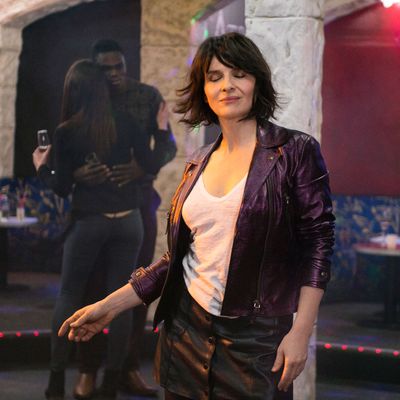
During an escape to the countryside with her bougie art friends, painter Isabelle (Juliette Binoche) finally snaps. While the Parisians ooh and ahh and offer their cerebral takes on the virtues of nature and the benefits of getting out of the city, she stomps off. “This landscape is yours! Everything is yours! Everything!” Her friends look at her in bewilderment, but let her go. By the next scene, she’s drinking Champagne at a local bar, mellowed out, ready for the next stranger to walk into her life and dazzle her.
That this is how Isabelle, divorced, unlucky in love, and deeply lonely, finally voices her long-percolating outburst is what makes Claire Denis’s warm, wise, somewhat unexpected foray into a kind of romantic comedy a Claire Denis film. Using Roland Barthes’s A Lover’s Discourse as a jumping off point for the script, Let the Sunshine In feels cream-puff light, but is deceptively rigorous, and about so much more than one woman’s quest to find the One. It’s about all the fragments that compose what may broadly be called romance: the highs and lows, the momentary obsessions, the endless dialogues that eventually must give way to ecstasy or disappointment.
In some ways, that makes it diametrically opposed to the mainstream romantic comedy, with its narrative symmetry and talk for talk’s sake. After a nice date with a moody actor (Nicolas Duvauchelle) and the start of a romance that both parties manage to psychoanalyze their way out of pursuing by the end of the night, they finally embrace, and their neurotic back-and-forth suddenly gives way to the sound of their kisses. “It feels so good to stop all that talking,” Isabelle sighs. It’s fascinating to see Denis, who certainly knows when to go nonverbal in order to reach the sublime, translate that sensibility onto such a seemingly quotidien emotional narrative.
As Isabelle floats from one would-be love to the next — the well-to-do banker who fetishizes her bohemian existence (Xavier Beauvois), the sympathetic art-world colleague who is perhaps too polite and convenient (Alex Descas) — the film rides the tide of the joy and exhaustion of other people intuitively and sensitively. Binoche has never been more radiant; Isabelle feels everything all the time, her eyes often sparkling with the beginning of tears at the slightest provocation. We sense that love has never been something she’s been able to take lightly, least of all now, at the crisis point she perceives herself to be in. Her most out-there tryst, with a working-class man she brings back to Paris with her like some artisanal quilt, starts in that bar in the country, to the rapturous strains of Etta James’s “At Last.” Sylvain (Paul Blain) approaches Isabelle for a dance, and in that moment, wordless and sensual, the fact that they have nothing in common, that he barely even speaks the same language as her, ceases to matter.
Other films have addressed this kind of dynamic with crasser, more literal results; Denis treats it all with a kind of serenity, hardly able to imagine an “end” to Isabelle’s struggles, because what would that possibly look like? The film itself seems reluctant to tie itself off, giving us one of the great end-credits-as-scene sequences of the last year (Call Me by Your Name and Good Time being other memorable examples). In the final minutes, Gerard Depardieu lumbers into the picture, walking out of what appears to be a kind of romantic disappointment Isabelle would be sympathetic to. He’s a love psychic, and Isabelle has come to him for guidance about her various affairs. He offers her advice, which feels as circuitous and lacking in finality as the film, the only repeated dictate being to remain “open.” (Spoken in English, no less.) As we’ve seen over the last 90 minutes, that can be a lot to ask, but as Isabelle smiles, eyes sparkling, internalizing that command, she knows, and we know, that it’s the only possible way forward.

